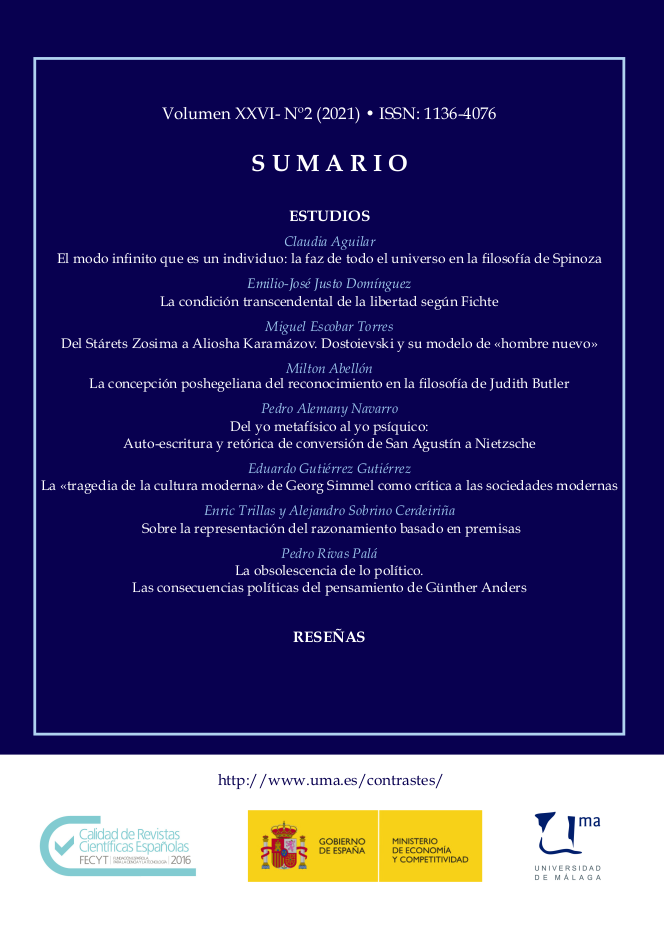From the metaphysical self to the psychic self
Self-writing and conversion rhetoric from Saint Augustine to Nietzsche
DOI:
https://doi.org/10.24310/Contrastescontrastes.v26i2.10113Keywords:
Philosophical autobiography, self-writing, conversion rhetoric, religion, secularizationAbstract
This article will discuss, from a diachronic perspective, the rhetorical formulas of conversion present in the self-portrait of the thinker who embarks on the introspective, retrospective and alterspective journey that the self-writing process entails. Furthermore, the evolution from the metaphysical self to the psychic self will be framed in the history of philosophical autobiography; an evolution closely related to a progressive secularization of the rhetoric of conversion and of the self-writing process itself.
Downloads
Metrics
Publication Facts
Reviewer profiles N/A
Author statements
Indexed in
-
—
- Academic society
- N/A
- Publisher
- Universidad de Málaga
References
AGUSTÍN, O.H. 1983: Confesiones. Madrid: Espasa Calpe. Disponible en web: <http://www.cervantesvirtual.com/obra-visor/confesiones--0/html/>
ALEMANY NAVARRO, P. (2020), «?Versions of self-search and self-transcendence in a posthuman paradigm», en E. Parra-Membrives y M. Almagro-Jiménez (eds.), From Page to Screen / Vom Buch zum Film. Gunter Narr Verlag.
AUGUSTINE. 1992. Confessions. Oxford / New York: Oxford University Press.
BELL, R. (1977), «Metamorphoses of Spiritual Autobiography», ELH 44, 1, pp. 108–26.
BUSH, D. 1962. English Literature in the Earlier Seventeenth Century, 1600-1660. Oxford: Clarendon Press.
DORSEY, P. 1993. Sacred Estrangement. The Rhetoric of Conversion in Modern American Autobiography. University Park, Pennsylvania: The Pennsylvania State University Press.
ESPOSITO, R. 2006. Communitas : Origine e Destino Della Comunita?. Torino: Einaudi.
FIREMAN, G.D., T.E. McVay, y O.J. Flaagan. 2003. Narrative and Consciousness. Literature, Psychology and the Brain. Disputatio. Vol. 6. Oxford Scholarship Online. Disponible en web: < https://oxford.universitypressscholarship.com/view/10.1093/acprof:oso/9780195140057.001.0001/acprof-9780195140057>
FREUD, S. 1924. Zur Einführung des Narzißmus. Leipzig / Wien / Zürich: Internationaler Psychoanalytischer Verlag.
FROMM, E. 1989. Gesamtausgabe. Stuttgart: Deutsche Verlags-Anstalt.
ISRAEL, J.I. 2011. Democratic Enlightenment: Philosophy, Revolution, and Human Rights 1750-1790. New York: Oxford University Press.
JUNG, C.G. 1991. Psychologie und Religion. 6. Aufl. Mu?nchen: Dt. Taschenbuchverlag.
LACAN, J. (1949), «Le Stade du miroir comme formateur de la fonction du Je», Revue Française de Psychanalyse, 13, 4, pp. 449-455.
LANGER, D. 2005. Wie man wird, was man schreibt: Sprache, Subjekt und Autobiographie bei Nietzsche und Barthes. Paderborn / München: Fink.
MILL, J.S. 2013. Autobiography. Cambridge: Proquest LLC.
MORRIS, J.N. 1966. Versions of the Self: Studies in English Autobiography from John Bunyan to John Stuart Mill. New York: Basic Books.
NADER, K. (2015), «Reconsolidation and the Dynamic Nature of Memory», Cold Spring Harbor Perspectives in Biology, 7, 10, pp 1-16.
NIETZSCHE, F. 2017. Ecce Homo: wie man wird, was man ist. Nikol Verlag.
OTTEN, W. (2011), «Special Issue: The Augustinian Moment», Journal of Religion, 91, 1, pp. 1-4.
ROS GARCÍA, S. (2004), «La Conversión de Santa Teresa», Revista de Espiritualidad, 63, pp. 367–86.
ROUSSEAU, J.J. 1782. Les Confessions (Texte Du Manuscrit de Genève). Disponible en web: < https://ebooks-bnr.com/ebooks/pdf4/rousseau_les_confessions.pdf >
SANCHIÑO MARTÍNEZ, R. 2013. «Aufzeichnungen eines Vielfachen»: zu Friedrich Nietzsches Poetologie des Selbst. Bielefeld: Transcript.
SOMMER, A.U. 2013. Kommentar Zu Nietzsches «Der Antichrist», «Ecce Homo», «Dionysos-Dithyramben», «Nietzsche Contra Wagner». Berlin: De Gruyter.
STOCK, B. 2011. After Augustine: The Meditative Reader and the Text. Philadelphia University of Pennsylvania Pr.
WITTMAN, E.O., y Maria DiBattista, eds. 2014. The Cambridge Companion to Autobiography. Cambridge Companions to Literature. Cambridge: Cambridge University Press.
WRIGHT, J.L. 2006. The Philosopher’s “I”: Autobiography and the Search for the Self. Albany, NY: State University of New York Press.
Downloads
Published
How to Cite
Issue
Section
License
This journal provides immediate free access to its content under the principle of making research freely available to the public. All content published in Contrastes. Revista Internacional de Filosofía, are subject to the Creative Commons Attribution-NonCommercial-ShareAlike 4.0 license whose full text can be found at <http://creativecommons.org/licenses/by-nc-sa/4.0>
It is the responsibility of the authors to obtain the necessary permissions of the images that are subject to copyright.
Authors whose contributions are accepted for publication in this journal will retain the non-exclusive right to use their contributions for academic, research and educational purposes, including self-archiving or repository in open access repositories of any kind.
The electronic edition of this magazine is edited by the Editorial Service of the University of Malaga (Uma Editorial), being necessary to cite the origin in any partial or total reproduction.










5.png)
